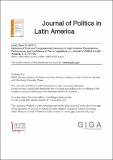|
Reseña:
|
What role do Latin Americans expect legislatures to play vis-à-vis the executive? How do expectations shape political trust in a developing democracy like Peru? This article introduces new indicators gauging citizens’ current perceptions of, and idealized expectations for, the institutional inde- pendence of their elected assemblies. It uses 2007 data to test the hypothesis that the gap between the two indicators – the “legislative autonomy gap” – predicts trust in Congress. Most Peruvians claimed to prefer a more auton- omous legislature. And citizens whose high expectations for institutional independence were adequately met were more likely to express confidence in Congress. However, having low expectations of congressional autonomy met also enhanced confidence in that institution. Trust in Congress proved to be pragmatic too, tied to perceptions of strong national economic per- formance, confidence in political parties, approval of congressional leader- ship, and approval of the same president from whom most Peruvians wished Congress would become more independent. |

